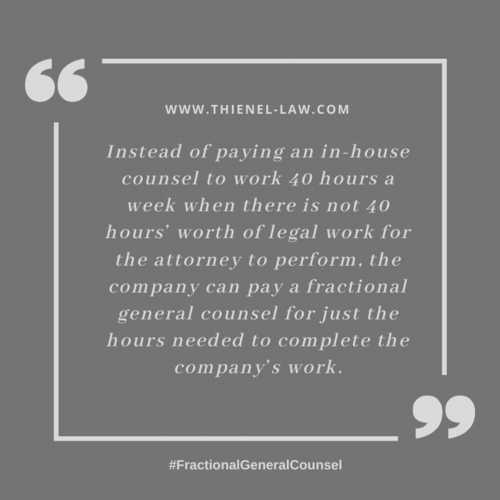What is the Difference Between Fractional General Counsel and Traditional In-House Counsel?
Companies that offer fractional business services are growing and thriving in the business world. Many companies are utilizing fractional business services, including fractional legal services. Entrepreneurs quickly realize that they need a team of business professionals to operate their business and make a profit.
However, there may not be enough money yet to hire full-time business professionals. Enter fractional business services. One area of particular interest to many companies, including startups, small businesses, and large corporations, is DC fractional general counsel in the context of in house counsel vs general counsel. In this article, we discuss the differences between fractional general counsel and traditional in-house counsel, and why DC fractional general counsel might be the right choice for your growing company.
Highlights from this article include:
What Are Fractional Business Services?
Define counsel
What Is In-House Counsel?
Deciding When a Lawyer Is Needed
Difference Between Fractional General Counsel and Traditional In-House Counsel
Similarities Between Fractional General Counsel and Traditional In-House Counsel
Summary — Benefits of Fractional General Counsel
What are Fractional Business Services?
Let's define what we mean by fractional business services. This term is another name for outsourcing. Fractional professionals are independent contractors instead of full-time employees of the firm. However, fractional professionals are more than just an outsourced service.
Retaining fractional services is more like hiring a part-time employee than outsourcing to an independent company or individual. Professionals provide part-time services for a company based on a retainer or contract agreement. The company receives the benefits of a part-time employee without the in-house cost of hiring an employee, such as benefits and employment taxes.
A fractional professional divides his or her time between multiple companies. For example, a fractional accountant may work for one company two days per week and another company three days per week. A fractional CFO may work a set number of hours each week for several companies. Fractional professionals can work for companies on a long-term basis or work on a project-basis or serve in the interim while the company is searching for a full-time professional to fill the role.
What Is Meant by In-House Counsel?
Before we begin discussing the differences between a fractional general counsel and a traditional in-house counsel, it's helpful to discuss what we mean by traditional in-house counsel.
Traditionally, companies hire law firms, lawyers, and other outside counsel as they need them to perform a variety of legal services. The legal services for which businesses routinely require assistance from attorneys include, but are not limited to:
Business formation and registration
Taxation
Contract review and creation
Employment-related issues
Business litigation and dispute resolution
Commercial transactions
Compliance
Business succession planning
Mergers and acquisitions
Business financing
Property acquisition and transfers
Document review services
Most businesses consulted with a business lawyer when they formed their business, and they may have consulted with attorneys who have special expertise as they had questions or issues related to specific business matters. However, at some point, many business owners realize they need answers to legal matters that impact their daily operations. They find themselves calling attorneys more frequently and paying expensive hourly rates for legal advice. Therefore, they consider hiring in-house counsel instead of using outside legal counsel.
What Does In-House Counsel Do?
The main difference between in-house counsel and outside legal counsel is that the in-house lawyer is an employee of the company. The lawyer has no other clients. He works solely for the company handling all legal matters for the business. Some matters may continue to be outsourced if it requires specialized legal knowledge. However, it is also the job of the in-house general counsel to manage outsourced matters and work with law firms retained by the company to resolve the outsourced matters.
In-house attorneys become familiar with all aspects of the business. Therefore, in-house general counsel is often consulted on policy-making and business decisions that might not be specifically legal in nature. Some company owners rely on in-house counsel to provide advice on a variety of issues related to the business, including marketing, hiring, acquisitions, and advertising. A legal perspective can be valuable in almost every business matter.
Deciding When a Lawyer Is Needed
Another problem faced by many company owners is when they need a lawyer. Hiring an outside attorney or in-house general counsel can be expensive for a company, especially for start-ups and small businesses. To save money, some business owners approach legal matters with a DIY approach. If they can do it themselves without an attorney, they can save money for the company.
Unfortunately, tackling such matters without an attorney can cause significant additional liability and cost for the company. While it might seem simple to fill out a boilerplate business form or a standard IRS form, your responses could expose the company to unwanted risk or liability. A simple box checked or unchecked on an IRS form could result in additional taxes for the company. Suddenly this early cost-saving measure has cost the company tens- to hundreds- of thousands of dollars.
Because managing and growing a business typically requires an owner's full attention, it can be difficult to devote the time to learn about legal issues. It is easier, and typically safer, to allow an attorney who has experience with these matters to handle them. However, that puts a business owner in the position of trying to hire law firms as needed, which can be expensive. Therefore, the owners considers whether to hire in house counsel vs outside counsel.
The owner may consider in-house counsel because they can receive the benefits of having full in house counsel services. However, hiring in house counsel can also be expensive because the company must pay employment taxes and benefits for the in-house attorney.
Is there a better solution than general counsel vs in-house counsel?
Difference Between Fractional General Counsel and Traditional In-House Counsel
Many benefits of hiring a fractional general counsel for your company lies with the differences between fractional and in-house counsel. Some differences that highlight the advantages of a fractional general counsel are:
Employee Vs. Independent Contractor
The most obvious difference is that a fractional general counsel is not an employee of the company. When a company hires in-house counsel, it must pay employment taxes, benefits, and overhead for the attorney besides paying thee average general counsel salary.
The cost of in-house attorneys has increased. When corporate legal departments first became popular, companies could save money by hiring full-time attorneys. However, many corporate legal departments mirror competitive law firms, including higher salaries for in-house attorneys. Today, general counsel salary for many in-house attorneys is as much as or more than their counterparts at major law firms. Therefore, in-house counsel can be more expensive than hiring lawyers for specific matters.
With fractional general counsel, a company can afford to have a part-time in-house counsel without the high cost of a full-time employee.
Legal Needs Dictate Price
Some companies may need a fractional lawyer for one day a week or one day a month. They might need fractional legal services for a couple of days each week. The legal needs of the company dictate the time a fractional general counsel spends working for the company, which determines the price charged for services.
Instead of paying an in-house legal department to work 40+ hours a week when there is not 40 hours' worth of legal work for the attorney to perform, the company can pay a fractional general counsel for just the hours needed to complete the company's work. However, the company has a fractional attorney “on call” that it can reach whenever a legal matter needs immediate attention.
Your Office Or Their Office
In-house corporate counsel works at the company. Therefore, the company must provide an office, furniture, staff, and other supplies for the corporate counsel to perform his job. However, a fractional general counsel can work at the company or from the individual's personal office. The flexibility of hiring an attorney on a part-time basis allows companies to choose the best arrangement for their needs, budget, and space.
General Counsel And Specialized Counsel
An in-house attorney typically focuses on business-related legal matters. The attorney may not have specialized knowledge related to all legal matters. Therefore, the company may still need to outsource some of the legal services besides paying for a full-time in-house general counsel.
However, fractional general counsel law firms often have several partners with various specializations. Working with a fractional law firm, you have access to attorneys with experience in various business-related subjects. Many fractional general counsel firms also offer discounted fractional legal services for matters that might not be covered under the basic agreement.
Similarities Between Fractional General Counsel and Traditional In-House Counsel
There are several similarities between fractional general counsel and traditional in-house counsel that benefit companies too. For example, many fractional general counsel firms are comprised of seasoned attorneys who served as in-house general counsel for many years. These attorneys may not work as full-time in-house counsel any longer for a variety of reasons. However, their experience and vast knowledge of business make them a valuable asset for fraction general counsel.
Small businesses and startups can now have access to the experience and legal knowledge of a seasoned general counsel by hiring a fractional general counsel at a cost they can afford. By offering their services on a part-time basis, attorneys serving as fractional general counsel for companies continue to provide exceptional legal services, but they do so for several companies simultaneously.
Another common factor that in-house counsel and fractional general counsel share is that they become intimately familiar with the company, the owners, and the employees. A fractional general counsel works directly with the company and employees regularly. Just as in-house counsel, the fractional general counsel forms closer relationships and understands the company on a more comprehensive level. Attorneys and law firms who work for the company on specific projects or only when a legal problem arises do not have intimate knowledge of the company and its owners.
“Like in-house counsel, the fractional general counsel is proactive.”
— Steve Thienel
Fractional general counsel, just like in-house counsel, can have email addresses on your email system, have an extension on your telephone system, receive mail on behalf of the company, and have support staff that works directly for the fractional general counsel. Because of the flexibility of plans offered by fractional general counsel firms, a company can customize the fractional legal services it receives to closely mimic what it would receive from in-house counsel or arrange for services that are more like a traditional outsourced attorney.
Like in-house counsel, the fractional general counsel is proactive. This attorney works with the company to help avoid problems before they arise. A fractional general counsel can attend corporate meetings to provide legal counsel and opinions regarding business deals, product plans, development, growth, risk management, and financing. Because a fractional general counsel has the benefit of gaining day-to-day perspective from working with the company on a regular basis, he can offer valuable advice to avoid costly mistakes, just as an in-house attorney would.
Benefits of Fractional General Counsel
We have discussed a great deal of information about the differences and similarities between fractional general counsel and traditional in-house counsel. To summarize, let's review the benefits your company can receive by utilizing legal services provided by a DC fractional general counsel:
Avoid overhead and employment costs associated with in-house counsel and corporate law departments.
Flexible cost plans that allow companies to budget for general counsel legal services.
Affordable legal counsel from an attorney who knows and understands you, your company, and your employees.
Potential for discounted legal services from the same provider for services outside of the plan.
Negotiate lower fees for fractional general counsel based on long-term contracts.
Timely access to an attorney for time-sensitive matters.
Small businesses and startups have access to seasoned, experienced general counsel for an affordable price.
It allows owners and managers to focus on operations instead of legal and compliance issues.
Someone to coordinate and manage outsourced legal services, if necessary.
Proactive legal counsel can avoid mistakes and problems that increase risk of liability.
A lawyer to manage crises and provide sound legal advice on business matters not specifically legal matters.
Companies can benefit from general legal counsel during all phases of operation. A DIY approach to legal services can be more costly in the long-term. Hiring a full-time, in-house attorney can be too costly, but searching for a lawyer you can afford each time you need legal advice can be frustrating and costly.
DC fractional general counsel makes it affordable for companies of all sizes to have the legal advice they need as they grow and expand their business. To learn more about our DC fractional general counsel services and if a fractional general counsel is right for your company, contact Steve Thienel today.
10 Benefits of a Fractional General Counsel and Why You Want One
If you own a business, legal fees are an oft-forgotten, or grudgingly-added line item on the budget. Ironically, those business people who budget for legal expenses often get more value than those who don’t because of their taking a proactive approach to legal issues.
For these savvy business people, a well-drafted contract or half-hour phone call with a competent business attorney who is knowledgeable about their business can save them from getting into legal troubles and incurring hundreds of thousands of dollars in litigation expenses.
As a Maryland business attorney, I ask my business clients these questions in order to determine whether a fractional general counsel is right for them:
Do you spend your time chasing legal concerns instead of focusing on your daily operations and growing your business?
Is hiring a full-time attorney too costly for your company?
Are you concerned that you do not comply with all legal requirements of your business?
Is it difficult to receive the legal advice you need when you need it?
If you answered yes to any of the above questions, you might need the services of a fractional general counsel for your business. Before you hire an in-house attorney, or you continue to seek the advice of an attorney on an add-needed or emergency basis, let’s look at the benefits of hiring a fractional general counsel.
What is a Fractional General Counsel?
Sometimes, individuals confuse a Fractional GC with in-house counsel because they receive many of the same services from a fractional general counsel as they do from in-house counsel, but this attorney is not an employee of the business nor does the attorney work full time for the company. A fractional general counsel is a part-time attorney who provides on-going legal services for your company at a flat-rate or fixed pricing structure.
The attorney or law firm has other clients, but you receive a specific number of hours each month of dedicated service to your company. For a set fee, you have access to the fractional general counsel for legal emergency or general legal advice. If you need additional services beyond the set number of hours per month, you typically pay an agreed-upon hourly rate or set fee for specific services.
Because each company is unique, it is impossible to say for certain whether a company needs a full-time attorney as an employee or whether a fractional general counsel is sufficient. The need for a full-time attorney is based on the industry and your specific circumstances.
However, the benefits of receiving legal advice are the same across all industries. An attorney helps you deal with legal problems in addition to avoiding legal problems by ensuring your company complies with all federal and state laws.
What are the Benefits of a Fractional General Counsel?
Some benefits of retaining a fractional general counsel for your business include:
Personalized legal services at an affordable price. The availability of an attorney who knows and understands you and your business with whom you have an established relationship.
A set fee for a fractional general counsel allows you to budget for a professional’s services more accurately.
Ongoing legal advice and review to ensure compliance with various federal, state, and local laws.
Allows a small business that can’t afford to hire in-house counsel access to continuous ongoing legal services.
Potential to receive discounted legal services by negotiating a billing rate based on a long-term commitment.
Freedom and ability to focus on day-to-day operations and growth instead of worrying about compliance and legal matters.
Timely access to an attorney when needed for answers to pressing questions.
Ability to hire a law firm that can cover several legal areas including matters related to government compliance, employment law, benefits, financial matters, litigation, contract management, regulatory reviews, licensing, and employee benefits.
Flexibility to customize an agreement you can afford and that meets your needs for legal counsel.
Eliminate the costs of hiring a full-time attorney.
One of the best benefits of hiring a Maryland fractional general counsel is that you are taking a proactive approach to risk management rather than a reactive approach. Instead of reacting to legal problems, you are working with an attorney to prevent or mitigate future liability. Regardless of the size of a company, a reactive approach to dealing with legal matters and compliance issues increases the risk of future liability. A proactive approach can reduce the time and cost of dealing with legal disputes.
Fractional General Counsel Services Can Save You $$$
Besides saving money and reducing the risk of future liability, hiring a fractional general counsel means you are adding an attorney to your team. The attorney may be a part-time member of your team, but that does not mean that the lawyer is not an integral part of your team. With dedicated meetings each month, you, your management team, and your lawyer can develop strategies to improve and grow your business and save you from costly litigation.
Do Flat-Rate Legal Services Sound Appealing?
If you’re interested in learning more about my factional general counsel services, give me a call today. I’d love to share with you my strategies for keeping your business running in top shape.







